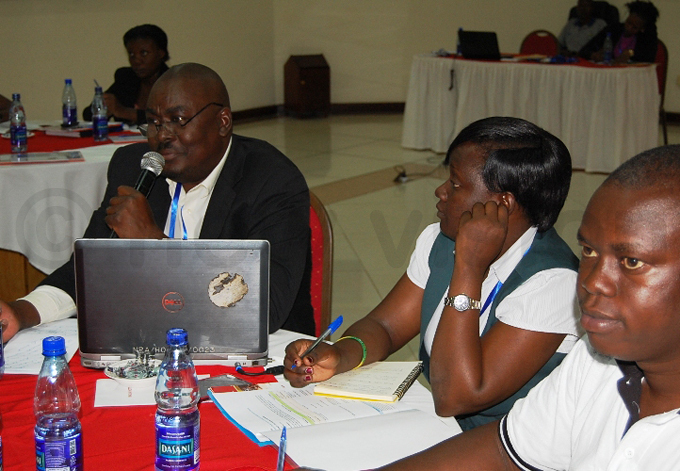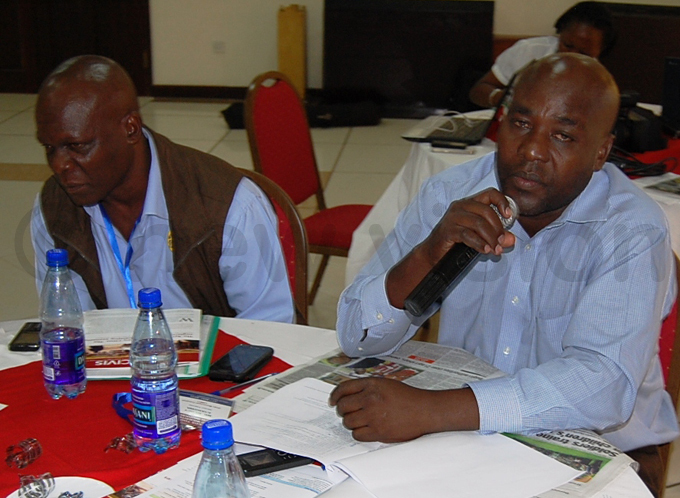Migereko calls for balanced service delivery
Urban development has some positive aspects despite the challenges
Government should ensure it balances service delivery in line with the rapid urbanization that the country is facing today Daudi Migereko the minister of Lands, Housing and Urban Development has said.
Migerko said rapid urbanization which comes with unique challenges is eating up most of the space for agriculture in the country, a factor that is considered to lead to high urban poverty and famine levels.
He explained that rapid urban development which the country is now facing also comes with other unique challenges like, high temperatures, floods, diseases and deforestation among others.
This was in the minister's speech delivered by commissioner in charge of urban development Padde Josepha Walter at a stakeholder's workshop on the draft Cities Development Strategies (CDS) toolkit and website for Jinja Municipality at Jinja Nile Resort Hotel on Monday.
The review was organized by the ministry in conjunction with Cities Alliance the longtime partner in urban development with the Ministry. The workshop was to validate the draft City Development Strategy (CDS) and website for Jinja Municipality.
It was attended by directors and consultants from Germany and Netherlands, representatives from Cities Alliance, out-going Jinja mayor Kezaala Muhammad Baswale and permanent secretaries.
"The increasing challenges faced by the urban areas do call for and necessitate timely and strategic interventions to reverse their probable negative effects. According to the World Bank and Uganda Bureau of statistics, urban population has doubled between 2002 and 2014 from 3million (12%) to 1 million (21%) and is projected to be at 50% by 2050 coming in the mentioned challenge," he noted.
Migereko further explained that more than half of the world's population lives in urban areas making the urban century faced with urban challenges.
However he explained that urban development areas do offer real opportunities for increasing economic vibrancy, competitiveness, energy efficiency, reduction of disparities in development and generally improved quality of life.
The minister noted that the workshop was held at a critical time where cities are expected to ensure continued growth, inclusiveness, resilience with sustainability more so in rapid urban development with the challenges posed.
The minister explained that he was honored that consultations and analysis leading to the developed CDS toolkit and website where done in Uganda adding that this was important because considering the outputs are expected to have global reach, access and use by other cities worldwide.
 A participant makes a submission during the session on how to manage the CDS. Photo by Doreen Musingo
A participant makes a submission during the session on how to manage the CDS. Photo by Doreen Musingo
 A Jinja municipal urban planner contributes to the discussion during the workshop. Photo by Doreen Musingo
A Jinja municipal urban planner contributes to the discussion during the workshop. Photo by Doreen Musingo
He said the CDS toolkit was and website is in its final stages is of great innovation as well as resourceful and that it's expected to provide solutions in addressing the prevalent challenges faced by the city authorities regarding municipal /city strategic planning.
He said the CDS concept is mainly confronted with the challenges that rotate around the integration within the existing national systems both locally and nationally.
According to Padde Walter the commissioner in charge of urban development in his own remarks said urban development has some positive aspects despite the challenges. He added that in Uganda 60% of the GDP comes from urban centres.
Padde noted that which is the pilot district for the program should be re-planned since they are advocating also for a city status. He noted that it has benefited from the Uganda Support Municipal Infrastructure Development (USMID) program supported World Bank.
"Jinja is looked as a city, if owners of the depilated buildings can renovate them then they demolish them because with the USMID project of the Nalufenya Clive road we can have those old build anymore in the town because now it needs standard structures in place," he noted.
Padde noted that Jinja is now prime, where its land has gained a lot of value. He encouraged the municipality authorities to carry out a detailed census of depilated building in the municipality to be condemned.
He stressed concern that Jinja should now be well planned with stored building in line with the physical plan of 2010 which declared the country a planning area.
According to the Jinja deputy town clerk told participants that Jinja has a seven point strategic plan which will be incorporated in the CDS. He said they include local economic development, poverty reduction and life improvement, environmental planning and management.
Others are tourism, sports and culture, Health and HIV AIDS, education and human development and good governance.
Samual Mabala the country team leader for Cities Alliance said the workshop was also aimed at validating the Jinja city development strategies and toolkit. He said consultations on the CDS will be complete by June.
He noted that it will also help on research studies for many students in various universities around the world.
According to Dr Amin Kiggundu Tamale from the college of engineering Makerere University said the CDS should have a project coordinator with good mobilize for resources to run the CDS.
Kenneth Barungi a manager from Kakira industries and also a member of the Jinja Municipal Development Forum said the project coordinator should not be a politician but instead be an engineer by profession to ensure smooth implementation of planned activities.
According to out-going Jinja mayor who closed the workshop said that the CDS should have strategic planning for the lost industrial glory of Jinja which was hit by the 1972 war and World Bank and International Monetary Fund (IMF) restricting.
The CDS started as a strategic planning for Jinja which involved the communities where by would organize debates at division levels, with children in schools, market vendors, transport operators and others to get views of Jinja they want in 10 years.
"Unless we don't step in now with the CDS then we shall have a big slum surrounding Jinja with lots of crimes," he noted.